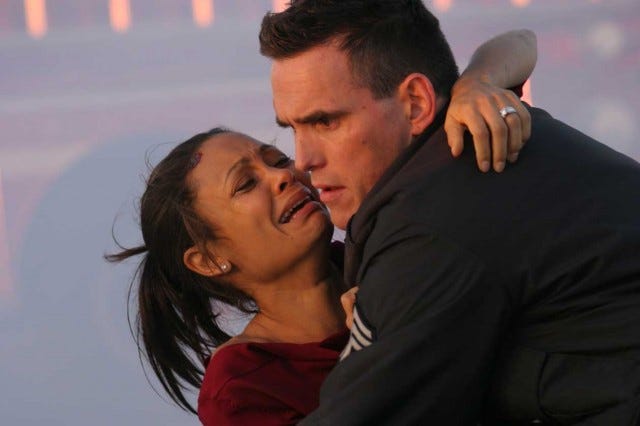And then Crash won Best Picture. My life has never been the same.
In my young adolescence, I was fueled by rage. What was the meaning behind this nonsense?! As God as my witness, I was never going to watch the Oscars again (I did... and continue to do so every year)!
 |
| My exact reaction when Crash won Best Picture |
Their conversation shifts to that of Brokeback Mountain. Having been a fan of Lee's film since I was 13, I was excited to see how this picture integrates into our modern approach to queer politics. This is mostly because I do not accept the film's label of the "gay cowboy movie." And if that is how we are marking this film, then we have ourselves a bigger problem than I had initially thought. Interestingly, the article does not offer much about the film regarding its cultural impact. Instead, they focus on the perceptions surrounding the film-- the fact that it is viewed as a revolutionary portrayal of queer desire and lost love. What Coney and Trodd get at is this cowboy code, one that Brokeback Mountain does not subvert. Stuck in a history of heteronormativity, Lee's film does little to rewrite a new frontier for these "gay cowboys." Which... honestly made me pause. What precisely did this mean? I mean, come on, film and television presents a unique opportunity to reflect reality, but doesn't this particular film offer more than "how can we look at cowboys differently?" Because for me, that is not what this film is about. Yes, two ranch hands fall in love and carry out an affair for years. Yes, the film is inherently queer. Yes, the film also functions as a political statement. But how can we remove the politics-- if at all-- to analyze the film on its own merit.
Perhaps I was confused because it seemed to me that Brokeback Mountain was placed under this microscope and was seen as an opportunity to advance the majority's misguided perceptions of the queer community. And maybe it even curbed a lot of expectations! But more than just what the frontier is, I think it is also crucial to look at the film at its release. What was said? Why were these things said? Clearly, the film left an impact on its audience. And VERY clearly, the film was a critical success. Is it not enough to say that it works in the cultural cannon of queer films? Must we take it to another level?
Much like my beef with the Academy, our discussion about this film is never-ending. Perhaps I need to explore the film again-- look at its nuances and intricacies one more time before I pass judgment. Because, quite frankly, I was swept into this tale of forbidden love that perhaps I am watching with rose colored glasses. Suffice it to say, the gay cowboy is not an identity marker that I ponder much. And while I will never say the film is attempting to critique this viewpoint, nor is it concerned with rewriting the cultural narrative surrounding it, Brokeback Mountain works as a stand-alone piece, not to mention one that prompts discussion in its audience. It may not have won Best Picture, but hey, we've still got the mountain.
No comments:
Post a Comment